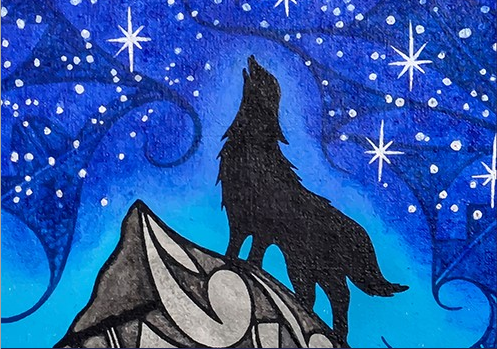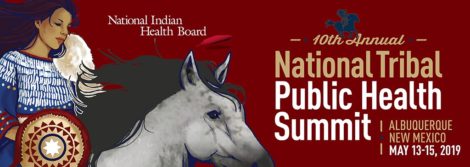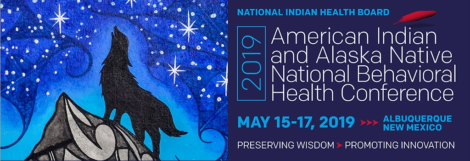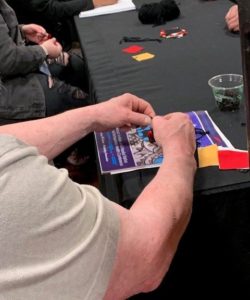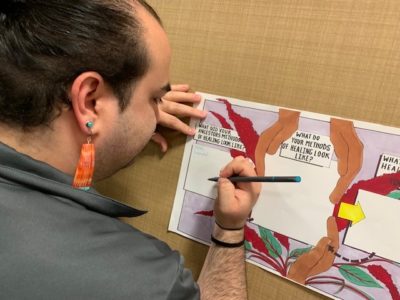The National Indian Health Board’s National Tribal Public Health Summit and American Indian and Alaska Native National Behavioral Health Conference are the nation’s premiere American Indian public health summits that attract over five hundred tribal public health professionals, elected leaders, advocates, researchers, and community-based service providers. This year the National Behavioral Health Network in collaboration with the National Native Network, two CDC National Networks aimed at eliminating tobacco and cancer disparities, presented at the summit to inform and empower providers, advocates, and leaders around integrating behavioral health prevention and treatment into cancer care and survivorship programming.
Behavioral health conditions affect clients in all stages of cancer, from diagnosis through survivorship, with more than 50% of patients with terminal cancer being diagnosed with at least one psychiatric disorder.[i] In comparison to the general population, individuals with a behavioral health condition may develop cancer at 2.6 times a higher rate on account of late stage diagnosis and inadequate treatment and screenings.[ii] Although incidence rates vary by tribe, region, and gender, cancer burden within American Indian and Alaska Native communities, particularly for those with behavioral health conditions, is disproportionately higher.
NBHN and the National Native Network were excited to engage participants in a workshop that provided an overview around cancer risk, prevention, treatment and intersections with behavioral health challenges and supports. In addition, the presentation discussed ways to increase screening and service provision in behavioral health settings, how to assess cancer risk education materials, and how to increase access to critical behavioral health services for cancer survivors. Participants were also engaged in activities exploring the role and importance of traditional medicines in cancer prevention and survivorship, such as traditional medicine bundles, tobacco ties, and healing using the seven sacred teachings central to American Indian culture and care.
Through this presentation, individuals were able to:
- Describe the implications of a cancer diagnosis and treatment relating to behavioral health outcomes
- Identify culturally tailored resources for cancer survivors
- Duplicate traditional medicine bundle construction and engage in a traditional healing graphic activity
Sources:
[i] Miovic, Michael and Block, Susan. Psychiatric Disorders in Advanced Cancer. Wiley InterScience. (2007).
[ii] Weinstein, L., Stefancic, A., Cummingham, A., Hurley, K., Cabassa, L. Wender, R. Cancer screening, prevention, and treatment in people with mental illness. CA Cancer K Clin. (2017)
Additional Organizations for American Indian and Alaskan Native Cancer Resources
- National Native Network
- Hopi Cancer Support Services
- Navajo Breast and Cervical Cancer Prevention (BCCP)
- Native American Cancer Research Corporation
- Indian Health Service
- National Indian Women’s Health Resource Center
- Tohono O’odhman Nation Cancer Prevention Program
- Montana American Indian Women’s Health Coalition
- Cherokee Nation Health Services
- Cheyenne River Sioux Tribe Cancer Early Detection Program
- The Kaw Nation Breast and Cervical Cancer Treatment Program
- Native American Rehabilitation Association (NARA) Integrated Health Clinic
- The Poarch Band of Creek Indians Tribal Health Department
- South Puget Intertribal Planning Agency
- Southcentral Foundation
- Yukon-Kuskokwim Health Corporation
- Northern Plains Comprehensive Cancer Control Program (NPCCC)
- Great Plains Tribal Chairmen’s Health Board (GPTCHB)
General Resources for Cancer Survivors
- Cancer Support Community (CSC) is a nonprofit network which provides social and emotional support and administers a toll-free helpline with educational resources for cancer patients and their families, friends, and caregivers. Learn more at https://www.cancersupportcommunity.org/.
- LIVESTRONG Foundation provides free, personalized cancer navigation services to patients, caregivers and providers. Patient navigators can aid with managing medical expenses and insurance challenges, fertility preservation, understanding treatment options, and accessing emotional support. Learn more at https://www.livestrong.org/.
- American Cancer Society provides a wide variety of services from emotional support to the latest cancer information for those who have been touched by cancer 24 hours a day, 7 days a week. Learn more at https://www.cancer.org/.
- Leukemia Lymphoma Foundation (LLS) is the world’s largest voluntary health agency dedicated to blood cancer. LLS provides free information and support services to patients and their families. Learn more at http://www.llf.org.sg/.
- Susan G Komen For the Cure provides resources to patients, caregivers and providers to include interactive learning, educational materials and videos, breast cancer educational toolkits, helplines, screening tools and clinical trials resources. Learn more at https://ww5.komen.org/.
